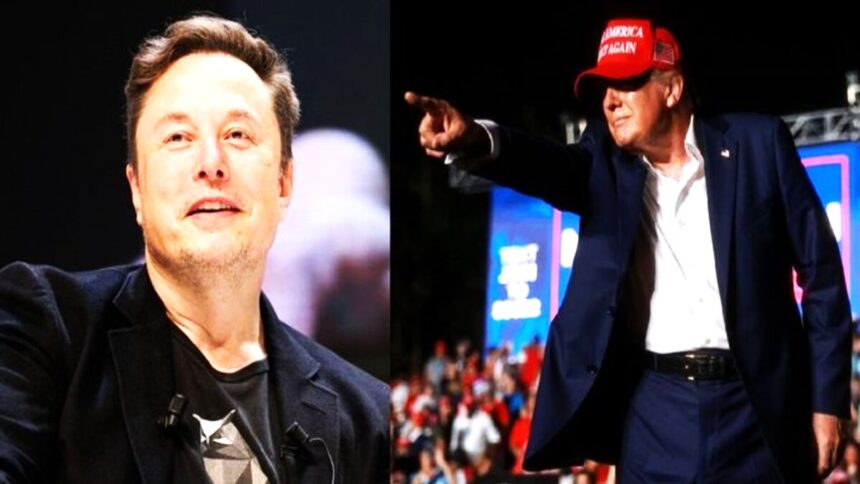In a dramatic announcement that raised eyebrows across political and business circles, President-elect Donald Trump revealed that he is tapping two of the most prominent figures in the tech and business world to spearhead an ambitious effort to overhaul the U.S. federal government. Elon Musk, the visionary behind SpaceX, Tesla, and other tech ventures, along with Vivek Ramaswamy, a former pharmaceutical executive and political newcomer, will lead what Trump called the “Department of Government Efficiency” (DOGE). The goal: to drive a sweeping reform of the federal government, slashing bureaucracy, reducing the size of the workforce, and cutting unnecessary spending.
A ‘Manhattan Project’ for Government Reform
In his statement, Trump described the new initiative as “the Manhattan Project of this era,” invoking the monumental scale of the effort that led to the creation of the atomic bomb during World War II. He promised “drastic change” across the federal bureaucracy, with the aim of achieving major cuts in government spending and reducing the size of federal agencies. Trump said he hoped this transformation would deliver a “perfect gift” to the nation on its 250th anniversary of the Declaration of Independence in 2026.
But despite the grand ambition, many details surrounding the plan remain unclear. Trump’s announcement did not specify how Musk and Ramaswamy would go about tackling the task or whether they would be given formal government positions to lead the reform effort. Nor did the statement outline whether they would need to hire additional staff or coordinate with existing federal agencies to carry out their vision.
Trump Says Musk and Ramaswamy Will Lead “Dept. of Government Efficiency”
Donald Trump is turning to two of his billionaire supporters, Elon Musk and Vivek Ramaswamy, to overhaul the federal government. pic.twitter.com/HuWqe3pmzM
— Faisal Ali Shah (@FaisalzUpdates) November 13, 2024The Challenge of Slashing Government
Both Musk and Ramaswamy bring significant business experience, but they are also polarizing figures. Musk, the CEO of SpaceX and Tesla, is known for his innovation in the electric car and space industries, while Ramaswamy is a wealthy entrepreneur who made a name for himself in the biotech sector before challenging Trump for the Republican presidential nomination in 2024.
Despite their successes in the private sector, the task they have been handed — dismantling parts of the U.S. federal government — is an incredibly difficult one. The federal government employs millions of people, manages trillions of dollars in spending, and oversees an array of crucial functions, from national defense to public health and education. Restructuring such a massive entity, even with the best of intentions, is a monumental challenge.
Musk’s past comments about slashing government spending indicate that he sees waste and inefficiency as a major problem in Washington. He has suggested that the U.S. could cut as much as $2 trillion from the federal budget. However, the specifics of how such cuts would be implemented remain vague. Musk himself has stated that the reform process will “send shockwaves through the system,” but how this will be achieved — and which areas of government will bear the brunt of the cuts — is still unknown.
Conflict of Interest Concerns
One of the immediate questions surrounding Musk’s role in the Department of Government Efficiency is how he will manage potential conflicts of interest. Musk’s companies, particularly SpaceX, rely heavily on federal contracts and oversight. Over the years, SpaceX has secured billions of dollars in government funding, and Musk has expressed frustration with the regulatory hurdles faced by his businesses, especially as SpaceX works to launch its Starship rocket.
Musk has been vocal about what he sees as excessive government regulation, especially from agencies like the Federal Aviation Administration (FAA) and the Interior Department. But now, as he seeks to overhaul the very agencies that regulate his companies, questions arise about how he can remain impartial in this new role, given his direct business interests. Trump’s statement suggested that Musk would provide guidance “from outside of government,” implying he may not take a formal government position, which may help alleviate some of the potential conflict-of-interest concerns.
Ramaswamy’s Radical Ideas for Government Cuts
Vivek Ramaswamy, who has made headlines for his outspoken and often controversial positions, is another key player in this government overhaul effort. Known for his criticism of the administrative state and government overreach, Ramaswamy has previously called for sweeping cuts to federal agencies. His proposals have included eliminating the U.S. Department of Education, the Internal Revenue Service (IRS), and even the Federal Bureau of Investigation (FBI) through executive order.
In addition to proposing drastic cuts to federal agencies, Ramaswamy has suggested reducing the federal workforce by 75% through mass layoffs. He has also advocated for eliminating foreign aid to countries such as Ukraine, Israel, and Taiwan, and has pushed for cuts in military spending. These ideas, while radical, reflect a broader Republican sentiment of reducing the size and scope of government. However, such bold proposals would likely face significant pushback from Congress and the public.

Previous Efforts at Government Reform
The concept of reducing government waste and inefficiency is hardly new. Past presidents have promised similar reforms, most notably Bill Clinton in the 1990s. As part of his effort to “reinvent government,” Clinton tasked Vice President Al Gore with overseeing a program called the National Partnership for Reinventing Government. While the initiative succeeded in eliminating some redundancies and cutting some government jobs, it fell short of a total transformation of the federal bureaucracy. The federal government’s workforce remains one of the largest employers in the world, with over three million workers.
Trump’s promise to “drain the swamp” and reduce government bureaucracy was one of the cornerstones of his political appeal. However, during his first term, these promises did not materialize into sweeping reforms. With Musk and Ramaswamy now in charge of the reform effort, Trump seems to be renewing his commitment to cutting government waste and inefficiency.
A Long Road Ahead
While the idea of slashing government spending and reducing the size of federal agencies may be popular among certain conservative factions, the practical implementation of such reforms is fraught with obstacles. Reductions in government spending could lead to significant job losses and disruptions in vital services, while dismantling agencies like the IRS or the FBI would likely face intense opposition from both lawmakers and the public.
In the coming months, as Musk and Ramaswamy begin their work, many will be watching closely to see how they navigate these challenges and whether their bold promises of reform translate into tangible change. Ultimately, the success of this ambitious government overhaul will depend on how well they balance the desire for efficiency with the need to maintain essential government functions and services.
A New Vision for Government?
While Trump’s plan for a smaller, more efficient government may resonate with many of his supporters, the real question is whether this vision can be effectively implemented. With Musk and Ramaswamy at the helm, the initiative could either mark a transformative moment in American governance or another ambitious promise that falls short of its goals. Only time will tell.
Read More : Judge Set to Decide Whether Trump’s Conviction in Hush Money Case Should Be Overturned






